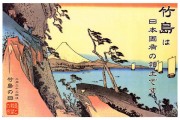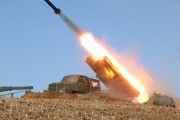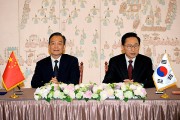
James E Auer, Director of the Center for U.S.-Japan Studies and Cooperation at the Vanderbilt Institute for Public Policy Studies.
In this article, which was recently feature on MSN Sankei news, U.S. academic James E. Auer, Director of the Center for U.S.-Japan Studies and Cooperation at the Vanderbilt Institute for Public Policy Studies, writes about his take on the historical relationship between Japan and Korea.
Touching on contentious issues such as the comfort women and the Takeshima/Dokdo dispute, Auer’s own appraisal of the Japanese Korean relations went down well with Japanese netizens, who agreed with him on every point.
But is Auer’s article an independent view of the situation? Or is it an ode to the current Japanese leadership?
From MSN Sankei News:
Interview With James E Auer – Let’s talk about the “True Story” between Japan and Korea
Last month, I visited Seoul for 3 days with an invitation from an elder statesman, who is a strong supporter of President Park Geun-hye.I asked to meet Korean politicians, government officials and businessmen, and was also invited to visit the Korean naval base on the north west coast. Unfortunately, most Koreans I met had negative opinions about Japan.
Comfort Women not unique to Korea
I asked why opinions have obviously changed since the agreement in 1998 between Japanese prime minister Obuchi Keizo and Korean president Kim Dae-jung, when they agreed to put an end to past problems and released a joint statement saying they will look towards the future instead.
Most Koreans I met said that their stance had not changed since 1998. Instead, they said that their current attitude is a reflection of the inconsiderate Japanese who continued to raise problems about the comfort women issue, the visiting of the Yasukuni shrine by Abe’s government officials, and the Japanese position regarding Takeshima/Dokdo.
I said that none of the current Japanese, Korean, nor American leaders have forgiven the prostitution that happened in China until the end of the war in 1945.
Although we do not have the exact numbers, it is possible that the number of Korean women that provided sexual service to Japanese soldiers who were sold off by their poor farmer parents or were recruited by other means, were a lot more than from other countries, including Japan and China.
However, it was not a campaign that targeted Koreans in particular, and there is no doubt that Japan sincerely regrets the true pain suffered by women of all nationalities that were part of this enterprise during the war.
At the time in Japan, prostitution was legal, and sexual services were provided towards the US armed forces during the American occupation.This is not to say that what happened was right but to show that the standards back then was very different from what it is now.
I said that the reason why Japanese leaders go to Yasukuni shrine is not to praise class A war criminals. Neither do they go there to praise the fact that Japan has apologized to other countries. I said that for a country that hates to be criticized over trivial internal matters as done by the Chinese government, it is hypocritical to criticize Japanese politicians for visiting a shrine that pays respect to the Japanese soldiers that died for their country.
Yasukuni and Arlington Are The Same
Many foreign leaders including Japanese and Korean leaders, as well as the president of the United States visit the Arlington national cemetery in Virginia, U.S. That is despite the fact that within the soldiers that rest there, there are some that fought for the South that supported slavery. Today, most developed countries do not permit slavery. However, there is no one asking to remove the soldiers of the South that supported it from the cemetery.
The most problematic issue when talking to Koreans was Takeshima/Dokdo. Stating that I do not think it is likely that the Japanese will change their stance regarding Takeshima/Dokdo as they have the advantageous legal foundation, I asked why the Koreans are so worried about the issue even though it is very unlikely that Japan should send their Self Defence Force to the island to expel the Korean soldiers. The only answer that came back, was that the Koreans think that the Japanese should agree that Takeshima/Dokdo invariably belongs to Korea.
I met just one group of people who did not complain about the Japanese. It was when I visited the Korean naval base. I saw the corvette ROKS Cheonan (patrol combatant craft) that was sunk by a North Korean torpedo. Though the South Korean Naval officers never talked politics, they spoke realistically of the necessity to cooperate with the Japanese Maritime Self-Defence Force and the American Navy against the North Koreans, who are acting dangerously and unpredictably.
The Contribution Of The Sino-Japanese War and the Russo-Japanese War To South Korea
What can be done to improve the stance of Koreans? One of my students who was born and lives in Seoul since graduating from Vanderbilt University over 20 years ago, said that the Japanese will have to be patient until the Koreans grow out of feeling inferior. Unfortunately that may be true, but I expect that president Park will be able to be on good terms with prime minister Shinzo Abe.
Although the Japanese never say this, I think that for South Koreans it is worth thinking of the fact that Japan won against Manchurian China in 1895 and again won against Russia in 1905 for the same reason. Although Japan was not against Korea, they were scared that Korea would be occupied by Manchurian China or Russia.
If Manchurian China had won the war, Korea may have been a Chinese colony now, or if Russia had won, a Russian colony.In the end, the Japanese victory led South Korea to the position it enjoys today, a free market economy and a democracy.
Comments from Twitter:
三田典玄:
The Korean government officials must voice the “Korean government’s official views” at least on the surface so even if they like Japan they can’t say it out loud. I often see these officials visiting Tokyo as a tourist with their families.
あまうめ:
This is the normal way to understand things. Even if it was similar Hashimoto’s was half baked, as well as the timing and who he said it to was terrible, only giving Koreans a reason to bash Japan.
Japan conservatism:
I would like all nationalists to read this article and recognize that Japan isn’t wrong. It’s all due to the Koreans having inferiority complex (almost an illness, personality disorder).
メンマ氏:
I laughed because it was so right, I don’t think anything of Korea but if I look at them as Koreans, the nationals are all ridiculous.
高速ナブラ:
The Sino-Japanese war and the Russo-Japanese war was meaningful in that it prevented Russia’s campaign to expand southward. If the Russians who wanted an ice-free port had come south, it was obvious that it would have been a footstep toward Japan.
〓 BAR HAYAFUNE:
Korea should be thankful to Japan for helping them out of being colonized by the Manchurian Chinese or the Russians.
佐々木:
I want as many Japanese people to read this article. I think that there is very little Americans who understand the core of the problem so accurately. I want Mr.Auer to lecture the next American Ambassador to Japan, Ms. Kennedy.
Aki:
Without taking sides, this is the normal way to see things…they should review the way they are trying to forcibly make us recognize twisted historical understanding.
EisenLowe:
I think they will go mad at us over this w
リアルポコニャン:
With the standards of 60 years ago, the private sector businesses offered prostitution, being paid what was above the norm. It’s true that no Japanese are asking the Americans to apologize for the prostitution that took place under the American occupation.
vlzg1127:
The historical reason why Korea has been able to enjoy its current position.
chewybrownie:
Is there going to be a day when the Koreans will look at reality?
MH:
This is a fair argument. Though I doubt that the Koreans will be able to come over their inferiority complex…
coba1coba:
Hmmm, it’s one way of looking at it.
There is no way that Koreans will accept this though.
The only way is to find a way together while there are different opinions…
ぶる~:
The biggest problem is that the Koreans cannot say such a fair argument in Korea //
蒲原二郎(TPP反対、OPIには賛成):
An interesting opinion by an American against the Koreans. The reality must be what the Korean naval officers said towards the end. The Japanese must keep this in mind. Not all Koreans are anti-Japanese.
茹骨@日本の何処か:
…it’s nice that he is speaking in favour of us, but if the Koreans would accept this, there wouldn’t be such a big problem(hah!)。>
翔2012:
Both China and Korea, having educated its citizens badly with the aim of steering internal discontent outwards, they are both struggling in their diplomatic relations, having chained themselves down in shackles!
此花龍一:
blockquote>It is a wonderful, logical argument. Japanese politicians must learn from him.
坊撃雲身鉄山靠:
Their anti-Japan campaigns are all to release internal discontent…







